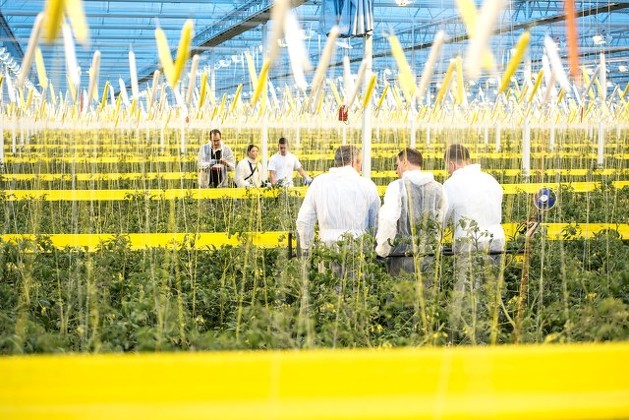Veresi Paradicsom Ltd. opened its innovative, all-year-round hydroculture-based tomato-growing glass house at its main location, Veresegyház.
On Dec. 14, 2018, connected to the inauguration, and in the presence of Dr. István Nagy, Minister of Agriculture as chief patron, the first harvest took place in Hungary’s most up-to-date plant house investment, equipped with artificial (HPS-based) supplementary lighting. This investment’s total cost is $1.5 billion, out of which a non-refundable support in the value of $500 million will be accounted for by the winning application that was handed in for the Rural Development Program’s invitation to tender, with the title “Modernizing Gardening”.

For the first time in Hungary, this development made feasible an all-year growing capacity, resulting in an increased competitiveness and a strengthened market presence for Veresi Paradicsom Ltd., both at home and abroad, and at the same time providing a chance to reduce the import of lower quality (primarily Spanish) tomatoes. The enterprise redesigned its production, initially aimed at a 95% export, so at present, we can report that the company sells 70% of its produce on the Hungarian market and the remaining 30% on foreign markets.

“Welcome in the 21st century, welcome in the renewal of Hungarian agriculture. Yes, this is how Hungarian agriculture will become. This is what we have to prepare for, what we have to do our best for,” Minister Dr. István Nagy.

Veresi Paradicsom Ltd.’s executive manager, Zsolt Márkus, left the world of multinational companies behind for the sake of gardening. In 2014, when the moment arrived that this father of three could only have had a chance of making headway in his job abroad, with a bold move, he ventured into growing tomatoes.

Besides the traditional hydroculture-based glasshouse gardening to which we are accustomed in Hungary, innovation, as well as integrating research-development and education in crop production, business development, and commercial activities have a great significance for Veresi Paradicsom Ltd. Thus, besides production investment, the enterprise is establishing an experimental glasshouse from its own sources for educational and attitude-changing purposes. In the building designed for research and development, as well as a visitor center, we offer a chance to get acquainted with the advantages and disadvantages of various crop husbandry technologies, dissipate false beliefs against glasshouse growing technologies, implement species experiments based on the Carpathian basin’s climate setting, research the dry matter content of tomatoes, as well as conduct commercial-oriented marketing researches and also complete continuous educational activities, knowledge. and technology transfer.

Industrial-sized husbandry that is oriented at LED-based artificial lighting for gardening purposes is as of yet unknown in the entire world; therefore, following the festive glasshouse inauguration ceremony – under the chief patronage of Dr. László György, state secretary of the Ministry for Innovation and Technology responsible for economic strategy and regulation – Veresi Paradicsom Ltd., Tungsram Operations Ltd., as well as Szent István University, signed a trilateral cooperation of intent to complete shared industrial-level research and development work, with the existing capacity of Veresi Paradicsom Ltd. left at the participants’ disposal.

Dr. Bence Tuzson, Veresegyház’s parliamentary representative, stated that his town rides in the vanguard of innovation, since they have a technology-based, world quality tomato growing husbandry in progress, serving Hungary’s future.

Back in 2014, Veresi Paradicsom Ltd. launched its business with a $5.8 million deficit, which they brought up to a taxed result of $13.5 million with a $311 million income. By 2016, this increased to near $80 million, with a turnover of $400 million, and last year, their performance was above a $650 million income and a $107 million taxed result. In the glasshouses, two gardening engineers – their degrees earned at the nearby Szent István University in Gödöllő – coordinate the professional work with the leadership of Dutch management. The computer-governed system sends them a notification via an internet application about any kind of fault or deviation in the site’s functioning. 80 % of the people working here originate from the neighborhood, and the rest have arrived from Transylvania for the season. Altogether, 40 people work at the site, with the 18 greenworkers present from the very beginning. Thanks to the thermal water, they operate a zero-emission heating system for which they have several thermal wells at their disposal in Veresegyház. This ensures a high operation safety, and the cooled-down water is not transferred to wastewater but pressed back, so the technology has no environmental strain. Irrigation water is gathered to an extent of 100% and reused after cleaning. In the previously 1.7-hectare glasshouse, 500 tons of tomatoes were picked on average per year in the 85-meter-long rows. This capacity now has been extended to 30.000 m2.








